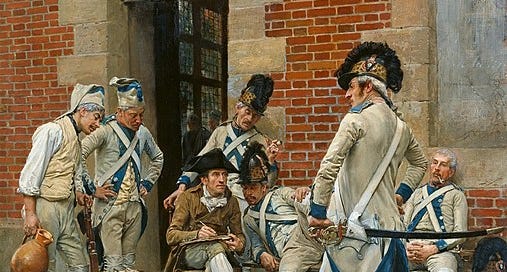The Tyranny of 'The Offer'
You should always listen to the blokes, but you shouldn't always do what they say...
2041: Corporal Smith joined the army in 2035. He was inspired by the Chinese surprise attack that created 'the Pacific standoff'. He witnessed the fallout of the 77 Brigade Information Operation to generate mass hysteria and therefore mass investment into the military. Expertly targeted, it renewed 'the offer'.
‘The offer’ was that elusive catch-all-term for everything that brings a man into service: the balance of self-interest.
Now he looks around and sees the ranks full. Never before have the blokes had so much spare cash. They had their own apartments and kitchenettes. They were barely worked for fear of upsetting their personal regimen, and great pains were made to accommodate their preferences.
Puzzlingly, they still weren't happy. Moaning had reached an all time high according to the algorithm. But at least the army was full of mediocre men fighting the spreadsheet current battle. No institution in all of mankind had managed risk as well as this. The army was at the cutting edge of intragovernmental competition, the fourth service having fallen woefully behind after its ideological detours.
2043: Sergeant Smith deploys to the Ost Front. Highly integrated into a super-interoperable high readiness force, he witnesses what was later known as The Second Battle of Jena.
It wasn't that operational complacency set in after Putin's assassination, it was more that the techniques didn't work. The thousands mining ‘Lessons Identified’ databases couldn't make sense of it, and the only deployed Company struggled to process the top tips everyone was sending in - they simply didn't have enough staff officers.
The information age of war had really arrived. We weren't ready. The pre-emptive satellite strike from the Chinese 2nd European Army meant Sergeant Smith just couldn't bring his cyber weapons to bear. The West capitulated, less Britain, who stood alone and under siege.
Some formations performed admirably. They made the same technical mistakes, but there was something else behind them that kept them ‘in’. They seemed to thrive in the struggle.
2046: The Ministry for War implemented radical reforms led by King George and his entourage. Anyone who he judged to possess energy and wisdom, he gave them a commission to act in his service. Colonel Smith applied the confidence he had been granted by the King - determined to learn of the missing ingredient. He recruited his own officers and dispatched them across Europe, charging them with studying the people's that dwelt there. Learning their languages, their woes, what they thought of being a Rus Protectorate, learning of their Gods.
Two of his 2nd Lieutenants never returned; too full of zeal to study the fortifications constructed to defeat UAS-cued satellite weaponry, they were discovered and executed. Colonel Smith took great pains to honour their work and used their examples to inspire recruitment for his independent battalions.
An entirely different breed joined, motivated by honour and revenge - or at least that is what they said. Following the King's example, he banned risk registers and made it clear to all officers that they were responsible for what happened around them, that a lack of vigour was worse than a mistake, and that they must serve their soldiers with a paternal and measured love, that extended to their families and beyond their service.
2050: The Crimean Stalemate broken, General Smith could finally sit down to write his memoirs. He visited the independent military schools that had been established where Regiments with sufficient funds from their patrons seconded some of their officers. He reflected on his time in service and wondered what was in store for his own children and grandchildren - who themselves hoped to continue the legacy of the King's Own Europa Infantry, although some had their own ideas of dedicating themselves to researching new applications in space artillery or subterranean chemical warfare.
The thing that most struck General Smith in his reflections though, was just how badly defence was understood in the 2020s. The fixation on certainty, the desire for getting more cash for 'the offer', the worship of efficiency - how foolish and wasteful it all was! How long it took us to learn!
He thought, if only we had realised that it is humans that make war, if only we saw empathy as a martial virtue, if only we had prized human judgement and the loving and good relationships demanded in martial prowess. Now that would have been a real offer.





